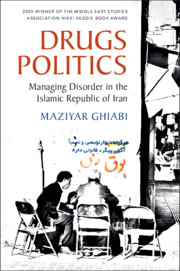Crossref Citations
This Book has been
cited by the following publications. This list is generated based on data provided by Crossref.
Buxton, Julia
2020.
Drug Control and Development: A Blind Spot.
Revue internationale de politique de développement,
Ghiabi, Maziyar
2020.
A Modern Contagion: Imperialism and Public Health in Iran‘s Age of Cholera, Afkhami Amir A., Baltimore, MD: Johns Hopkins University Press, 2019, ISBN 978-1-4214-2721-7 (hbk), 296 pp..
Iranian Studies,
Vol. 53,
Issue. 1-2,
p.
167.
Buxton, Julia
2020.
Fiscalización de drogas y desarrollo: un punto ciego.
Revue internationale de politique de développement,
Buxton, Julia
2020.
Contrôle des drogues et développement : un angle mort des politiques internationales.
Revue internationale de politique de développement,
Lim, Jinhee
and
Kim, Taekyoon
2021.
Bringing drugs into light: embedded governance and opium production in Myanmar’s Shan State.
Oxford Development Studies,
Vol. 49,
Issue. 2,
p.
105.
Farazmand, Ali
and
Danaeefard, Hasan
2021.
Crisismanship under the Most Severe Sanctions: Lessons Learned from the Iranian Government’s Responses to the COVID-19.
International Journal of Public Administration,
Vol. 44,
Issue. 13,
p.
1149.
Bastani, Parsa
2021.
Feeling at Home in the Clinic: Therapeutic Dwelling in an Addiction Rehabilitation Center in Tehran, Iran.
Ethos,
Vol. 49,
Issue. 2,
p.
119.
Acero, Camilo
and
Thomson, Frances
2022.
‘Everything peasants do is illegal’: Colombian coca growers’ everyday experiences of law enforcement and its impacts on state legitimacy.
Third World Quarterly,
Vol. 43,
Issue. 11,
p.
2674.
Ghiabi, Maziyar
2022.
Critique of everyday narco-capitalism.
Third World Quarterly,
Vol. 43,
Issue. 11,
p.
2557.
Ghiabi, Maziyar
and
Waetjen, Thembisa
2022.
Decolonizing Drug History? Notes on a Journey Southward.
The Social History of Alcohol and Drugs,
Vol. 36,
Issue. 2,
p.
119.
Ghiabi, Maziyar
2022.
The everyday lives of drugs.
Third World Quarterly,
Vol. 43,
Issue. 11,
p.
2545.
Maarefvand, Masoomeh
Ghiabi, Maziyar
and
Nourshargh, Fatemeh
2023.
Social work post-disaster response in Iran: A case study of the 2019 mass flooding in Poldokhtar, Lorestan.
International Social Work,
Vol. 66,
Issue. 2,
p.
547.
Ahmadi, Shaherzad
2023.
Uncertain Cures: The Medical Marketplace in Pahlavi Iran.
Iranian Studies,
Vol. 56,
Issue. 2,
p.
345.
Mirzaei, Saeid
Yazdi-Feyzabadi, Vahid
Mehrolhassani, Mohammad Hossein
Nakhaee, Nouzar
and
Oroomiei, Nadia
2024.
Unveiling the roadblocks: exploring substance use disorder treatment policies in Iran through a qualitative lens.
Addiction Science & Clinical Practice,
Vol. 19,
Issue. 1,
Pergolizzi Jr, Joseph
LeQuang, Jo Ann K
Vortsman, Eugene
Magnusson, Peter
EL-Tallawy, Salah N
Wagner, Morgan
Salah, Rania
and
Varrassi, Giustino
2024.
The Emergence of the Old Drug Captagon as a New Illicit Drug: A Narrative Review.
Cureus,
Mehrabi, Fatemeh
Mehmandoost, Soheil
Khezri, Mehrdad
Mousavian, Ghazal
Tavakoli, Fatemeh
Fathi, Hamid Reza
Jomehpour, Hamid
McFarland, Willi
Shokoohi, Mostafa
and
Sharifi, Hamid
2024.
Drug use and unsafe injection among adults who live in prisons in Iran: a systematic review and meta-analysis.
Drugs: Education, Prevention and Policy,
Vol. 31,
Issue. 2,
p.
179.
Momeni, Alireza
Hellman, Matilda
and
Ghiabi, Maziyar
2025.
“A Double Decline in Character”: A Grounded Theory Analysis of Female Drug User Experiences in Iran.
Contemporary Drug Problems,
Hunter, Mark
2025.
Penal-welfare systems in a (post)colonial world: The rise and disregard of alcohol and drug rehabilitation centers in South Africa.
Punishment & Society,
Vol. 27,
Issue. 2,
p.
215.
Ameli, Vira
Wong, Geoffrey
Barlow, Jane
Mohraz, Minoo
Meinck, Franziska
Taj, Leila
Amiri, Tayebeh
Boosiraz, Abbas
Sabin, Lora
and
Haberer, Jessica E.
2025.
How Mobile Health Can Change the Contexts of Living With HIV and Engaging With Treatment and Care in Iran: A Realist-Informed Qualitative Study.
Qualitative Health Research,
Vol. 35,
Issue. 2,
p.
156.



